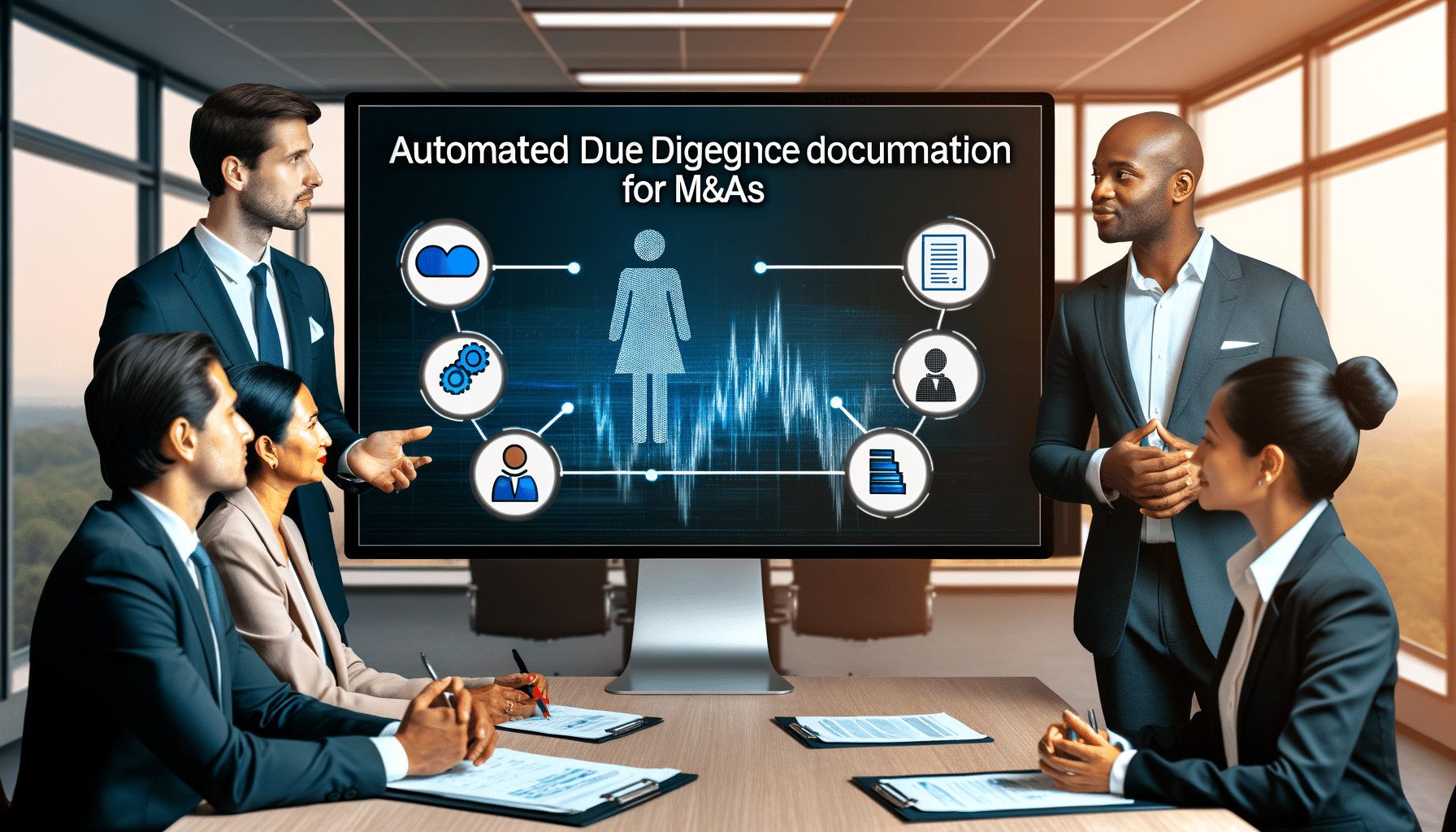- Corporate Governance
- November 16, 2024
Automated Due Diligence Documentation for M&As

The Future of M&A: Embracing AI for Automated Due Diligence Documentation
As anyone involved in mergers and acquisitions (M&As) knows, these transactions can be a daunting task. Due diligence is a critical step—one that demands attention to detail, a vast amount of data analysis, and, often, an army of professionals to execute effectively. But what if I told you that there’s a way to streamline this process, reduce human error, and save considerable time and resources? That’s where AI-driven automated due diligence documentation comes into play.
A New Era in M&As with AI
Throughout my entrepreneurial journey, I have continually sought ways to bring technological innovation to industries that seemed locked in tradition. AI is more than just a buzzword; it represents a seismic shift in how we approach business processes, particularly in areas like M&As, where efficiency and precision are paramount.
Utilizing AI in due diligence can transform mountains of paperwork into structured, accessible insights. It can sift through numerous data points, identifying risks, opportunities, and compliance issues much faster than any human team. In the fast-paced world of M&As, where timing can be everything, such capabilities are game-changing.
Why Automate Due Diligence?
The rationale for automating due diligence documentation with AI is simple: efficiency, accuracy, and compliance.
Efficiency: AI can handle repetitive and complex tasks at speeds unmatched by human effort. This means faster data processing and quicker identification of key information.
Accuracy: Human error is an ever-present risk in manual processes. AI reduces this risk significantly, ensuring that nothing is overlooked and that documentation is reliable.
Compliance: In the maze of regulatory requirements surrounding M&As, AI aids in checking compliance against numerous regulations, supporting adherence and reducing the risk of fines or legal issues.
AI-Powered Documentation Tools: The Backbone of Modern M&As
These AI tools take you beyond simple automation. They empower teams by offering features like:
- Natural language processing to extract and organize information from diverse documents swiftly.
- Machine learning algorithms that learn from previous transactions to predict potential risks and outcomes.
- Blockchain integration ensuring data integrity and tamper-proof records.
This isn’t mere automation; it’s the enhancement of human expertise through AI-enabled insights.
Practical Implications for Corporate Governance
M&A transactions are high-stakes endeavors where every detail matters. By adopting AI for due diligence, companies can ensure regulatory compliance, demonstrate transparency, and enhance accountability—key components of strong corporate governance.
Moreover, AI allows decision-makers to access comprehensive reports and analyses, providing the clarity needed to make informed decisions swiftly and confidently, even under tight timelines.
AI Transforming M&As: A Case Study
Consider a multinational corporation looking to acquire a tech startup. Traditionally, due diligence for such an acquisition might involve a lengthy process of financial audits, market analysis, and compliance checks. However, employing AI-driven solutions, this corporation could significantly accelerate the procedure, maintaining the same level of thoroughness and accuracy.
With AI’s capability to analyze vast datasets and identify patterns or anomalies, the corporation can focus on strategic decision-making rather than data gathering and interpretation, hence optimizing resources and outcomes.
The Road Ahead
As we look to the future, the integration of AI in M&As will become not just a competitive advantage but a necessity. Businesses that embrace these technologies will be better positioned to navigate the complexities of mergers and acquisitions, ensuring they remain agile and responsive to market demands.
For those of us at RecordsKeeper.AI, this is a vision we are eagerly contributing to. Through our innovative solutions, we aim to redefine what’s possible, not just in due diligence, but across all aspects of record management and compliance.
Conclusion: Chart Your Future with AI in M&As
In a world where the pace of business continues to accelerate, embracing AI for due diligence documentation in M&As offers a clear path to efficiency, security, and success. The potential to transform this traditionally labor-intensive task into a streamlined process aligns perfectly with the evolving needs of corporate governance.
As I continue my journey at the intersection of AI and business, I invite you to explore how these technologies can reshape your strategies and operations. Connect with me, Toshendra Sharma, to dive deeper into the exciting future ahead.
Toshendra Sharma is the visionary founder and CEO of RecordsKeeper.AI, spearheading the fusion of AI and blockchain to redefine enterprise record management. With a groundbreaking approach to solving complex business challenges, Toshendra combines deep expertise in blockchain and artificial intelligence with an acute understanding of enterprise compliance and security needs.
Related Posts

Organizing Committee Meeting Records
Managing committee meeting documentation effectively.
- November 17, 2024

Handling Corporate Meeting Minutes
Best practices for managing meeting documentation.
- November 17, 2024
Archives
- December 2024
- November 2024
- October 2024
- September 2024
- August 2024
- July 2024
- June 2024
- May 2024
- April 2024
- March 2024
- February 2024
- January 2024
- December 2023
- November 2023
- October 2023
- September 2023
- August 2023
- July 2023
- June 2023
- May 2023
- April 2023
- March 2023
- February 2023
- January 2023
- December 2022
- November 2022
- October 2022
- September 2022
- March 2019
Want to get more content like this?
Signup to directly get this type of content to your inbox!!
Latest Post
Organizing External Auditor Access
- December 22, 2024
Document Control in Manufacturing Plants
- December 21, 2024
Handling Rush Financial Report Requests
- December 20, 2024
Managing Record Access After Staff Changes
- December 19, 2024





